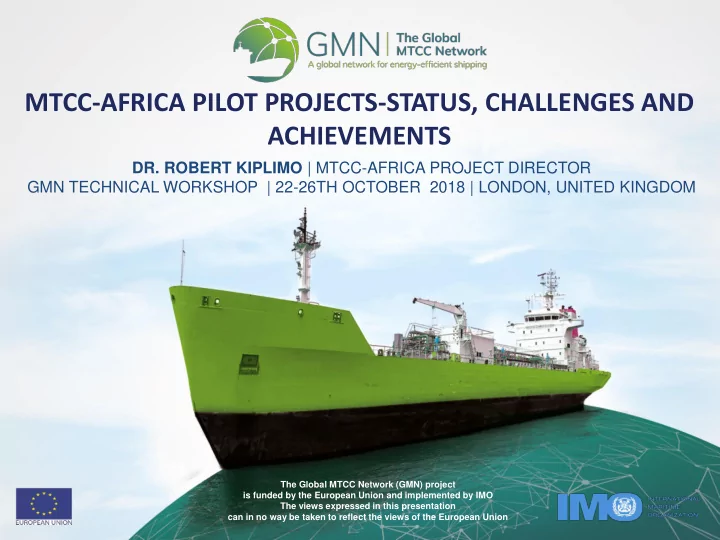

MTCC-AFRICA PILOT PROJECTS-STATUS, CHALLENGES AND ACHIEVEMENTS DR. ROBERT KIPLIMO | MTCC-AFRICA PROJECT DIRECTOR GMN TECHNICAL WORKSHOP | 22-26TH OCTOBER 2018 | LONDON, UNITED KINGDOM The Global MTCC Network (GMN) project is funded by the European Union and implemented by IMO The views expressed in this presentation can in no way be taken to reflect the views of the European Union
CONTENT REVIEW Introduction Pilot project I Current Status Time lines of Implementation Challenges faced and Future challenges expected 2
Introduction : Maritime domain Source: Maritime Technology handout by Professor T. Nakazawa (2013)) 3
Introduction : Pollution from Ships Indirect measures to support the GHG reduction efforts: Support the development and update of national action plan – Involved in National action plan Encouraging ports to facilitate GHG reductions from shipping – OPS proposed Encouraging technical cooperation and capacity building activities - National One way to reduce these Impacts for Vessels while staying in the workshops Port-OPS. Source: Second IMO GHG Study 2009 4
Pilot project status Supply of a connection Point to Berth No.1 targeting Roro Vessels A Max. of 2MVA (1.6KW) Supply capacity envisaged In Line with International standard for OPS systems; IEC/ISO/IEEE 80005-1 Utility connections in port- 6.6kV proposed for the Pilot Project Approx. Cost for the Pilot Project: USD. 210,000 Project designs for Shore power and approvals done. Tendering executed and awaiting approval from Ministry of Transport 5
Pilot project status Survey has been done on a few sample vessels that will participate in the pilot project. Figure shows crew demonstration of the vessel readiness 6
Pilot project status KPA committed to partner with the MTCC to run this pilot project by facilitating the following: Letter of commitment to fund the project – Funds approved in February 2018 Tendering process initiated – March 2018 Tender evaluation committee formed/ Technical Evaluation - May 2018 Tender awarded – June 2018 Process halted by Government with requirement for Cabinet approval – July to October 2018 with no formal communication 7
Comparison with the approved timelines Original proposal ACTIVITY/DURATION JAN FEB MAR APR MAY JUN JUL AUG SEP OCT NOV DEC Tendering, evaluation and Award Procurement of Shore Power Equipment Identification of Voluntary Vessels Installation, Testing and Commissioning Providing shore power to the ships Training of ship’s staff on shore power Sensitization on energy efficient operations and Low carbon technologies- (Crew, shipping lines) Project Monitoring and Evaluation 8
Comparison with the approved timelines Proposed time line No ACTIVITY/DURATION Sept. 2018 Oct. 2018 Nov. 2018 Dec. 2018 1 Contract Signing, Award and Kick off 2 Procurement of Shore power Equipment 3 Installation and Testing 4 Commissioning and Provision of shore power to the ships 5 Training of ship's staff on shore power 6 Sensitization on energy efficient operations 7 Project Monitoring and Evaluation 9
Comparison with the approved timelines 2019 original time-lines ACTIVITY/DURATION JAN FEB MAR APR MAY JUN JUL AUG SEP OCT NOV DEC Data analysis and reporting Final report and Project conclusion 2019 Proposed time- lines Jan. Feb. Mar. Apr. May. Jun. Jul. Aug. Sept. No ACTIVITY/DURATION 2019 2019 2019 2019 2019 2019 2019 2019 2019 1 Installation and Testing Commissioning and Provision of Shore 2 Power to the ships 3 Training of ship's staff on Shore Power Sensitization on energy efficient 4 operations 5 Project Monitoring and Evaluation Data analysis and reporting 6 Final report and Project conclusion 7 10
Challenges to the Implementation of OPS Currently, none of the African seaports have developed and implemented an OPS system for use by seagoing ships. This status is attributed to various challenges, among them: The high cost of installing an OPS system; Unsteady mains power supply and inability by most ports to generate own electric power; Lack of a legal basis to implement an OPS system due to many African countries not ratifying MARPOL Annex VI; Unpredictability working with third party in the implementation; 11
Thank you for your attention! http://gmn.imo.org/ MTCC-Africa website: http://mtccafrica.jkuat.ac.ke/ 12
Recommend
More recommend